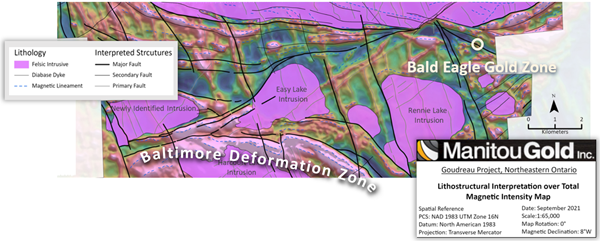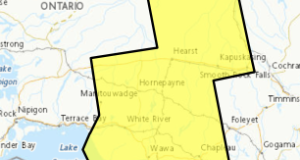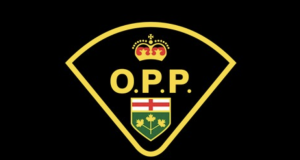Manitou Gold Inc. is pleased to announce that it has identified a new gold zone, the Bald Eagle Gold Zone (BEGZ) on its Goudreau project in northeastern Ontario. The BEGZ has been intersected with six drill holes over a strike length of 150 meters.
Highlights:
- Visible gold observed in the BEGZ hole MTU-21-43 with assays pending
- New gold zone identified in the northeastern portion of the project area with wide drill intersections of gold mineralization
- Intersection highlights of:
- 3.3 g/t Au over 3.0 m, including 5.2 g/t Au over 1.5 m within a wider gold mineralized interval of 20.6 m at 0.8 g/t Au in hole MTU-21-41; and
- 1.4 g/t Au over 9.0 m and 2.8 g/t Au over 1.4 m within a wider gold mineralized interval of 22.8 m at 0.9 g/t Au in hole MTU-21-39
- Currently drilling high priority targets on the west side of the Baltimore Deformation Zone (the “BDZ”)
Approximately 67% of Canadian gold production is found within this type of geologic setting, with examples including the nearby Island Gold Mine operated by Alamos Gold (TSX:AGI; NYSE:AGI) and many deposits located in regions within the Canadian shield, including Timmins (>70 Moz), Kirkland Lake (>40 Moz) and Val d’Or/Noranda (>69 Moz).
Six holes totaling 1,800 metres were drilled at the BEGZ, with results for four holes having been received to date (see Table 1). All four holes intersected significant gold mineralization, with highlights including 3.3 g/t Au over 3.0 m, including 5.2 g/t Au over 1.5 m within a wider gold mineralized interval of 20.6 m at 0.8 g/t Au in hole MTU-21-41 and 1.4 g/t Au over 9.0 m and 2.8 g/t Au over 1.4 m within a wider gold mineralized interval of 22.8 m grading 0.9 g/t Au in hole MTU-21-39.
Visible gold was encountered in the fifth hole (MTU-21-43) at the BEGZ and assay results will be released as they are received.
Gold mineralization at the BEGZ occurs within a highly strained sericite-pyrite schist and is open along strike and at depth. Detailed ground geophysical and geochemical surveys are underway and further step-out and step-down drilling is planned once results for the ongoing surveys have been received.
Table 1: Highlight Drill Intersections
| Hole ID | From | To | Core Length(1) (m) |
Au (g/t) |
Zone | |
| MTU-21-39 | 48.0 | 49.5 | 1.5 | 2.8 | Bald Eagle Gold Zone | |
| 181.9 | 183.0 | 1.1 | 1.6 | Bald Eagle Gold Zone | ||
| 216.0 | 238.8 | 22.8 | 0.9 | Bald Eagle Gold Zone | ||
| incl. | 217.0 | 226.0 | 9.0 | 1.4 | Bald Eagle Gold Zone | |
| incl. | 224.5 | 226.0 | 1.5 | 2.8 | Bald Eagle Gold Zone | |
| MTU-21-40 | 75.5 | 77.0 | 1.5 | 1.1 | Bald Eagle Gold Zone | |
| 116.9 | 121.5 | 4.6 | 0.9 | Bald Eagle Gold Zone | ||
| incl. | 120.0 | 121.5 | 1.5 | 1.3 | Bald Eagle Gold Zone | |
| 177.0 | 179.0 | 2.0 | 1.7 | Bald Eagle Gold Zone | ||
| 198.0 | 202.5 | 4.5 | 0.8 | Bald Eagle Gold Zone | ||
| 208.5 | 227.0 | 18.5 | 0.5 | Bald Eagle Gold Zone | ||
| incl. | 210.0 | 211.5 | 1.5 | 1.3 | Bald Eagle Gold Zone | |
| MTU-21-41 | 46.5 | 49.5 | 3.0 | 1.0 | Bald Eagle Gold Zone | |
| incl. | 46.5 | 48.0 | 1.5 | 1.5 | Bald Eagle Gold Zone | |
| 122.0 | 123.0 | 1.0 | 2.5 | Bald Eagle Gold Zone | ||
| 126.2 | 127.0 | 0.8 | 1.8 | Bald Eagle Gold Zone | ||
| 197.5 | 218.1 | 20.6 | 0.8 | Bald Eagle Gold Zone | ||
| incl. | 209.5 | 212.5 | 3.0 | 3.3 | Bald Eagle Gold Zone | |
| incl. | 209.5 | 211.0 | 1.5 | 5.1 | Bald Eagle Gold Zone | |
| MTU-21-42 | 78.7 | 80.0 | 1.3 | 2.4 | Bald Eagle Gold Zone | |
| 144.0 | 145.5 | 1.5 | 1.8 | Bald Eagle Gold Zone | ||
| 155.5 | 156.5 | 1.0 | 1.4 | Bald Eagle Gold Zone |
Drilling is currently testing new priority targets, including coincident multi-line gold +/- copper soil geochemistry anomalies with strike lengths of up to 350 m and coincident IP anomalies in close proximity to prominent structural intersections. These new targets are located along the BDZ, which represents the interpreted fault offset continuation of the Goudreau-Localsh Deformation Zone (the “GLDZ”). The GDLZ hosts Alamos Gold’s (TSX:AGI; NYSE:AGI) Island gold deposit and Argonaut Gold’s Magino deposit, in addition to a number of smaller-scale past producing mines, including the past-producing Cline and Edwards mines.
The Goudreau Project is located 50 kilometres northeast of Wawa, Ontario and is underlain by Archean-aged rocks of the Michipicoten Greenstone belt. The project area is traversed by several broad-scale deformation corridors (such as the BDZ and GLDZ), which host the majority of the important regional gold deposits and showings in the region.
The BDS is an eastward trending fault offset extension of the GLDZ, the later of which hosts two multi-million ounce gold deposits (1,2) and has seen over 1,000,000 metres of drilling for gold. As such, the BDZ is extremely under-explored along its 18 kilometre-long trend, with only 4,400 metres of historic gold drilling.
Manitou’s key strategic shareholders include Alamos Gold Inc. (TSX:AGI; NYSE:AGI) at 19.9% and O3 Mining Inc. (TSX.V: OIII; OTCQX: OIIIF) at 9.9%, each individually calculated on a partially diluted basis.
- Azadbakht, Z. et al., 2021. Report of Activities, 2020 Resident Geologist Program. Ontario Geological Survey Open File Report 6374, 43 p.
- Argonaut Gold Inc., (2021). Company website: https://www.argonautgold.com/English/home/default.aspx, September 26, 2021
Sampling and Quality Control
Samples were delivered to Activation Laboratories (“Actlabs”) in Thunder Bay, Ontario. At the laboratory, samples were crushed up to 80% passing 2 mm, riffle split (250 g) and then pulverized to 95% passing 105 microns. Gold was analyzed by fire assay with an AA finish, using the 50 g sub-sample. Over limit analysis was performed on all primary assay results >3 g/t gold. All over limits were tested by fire assay with gravimetric finish using a 50 g sub-sample. Actlabs is a certified and ISO 17025 accredited laboratory. Standards and blanks were routinely inserted into the stream of core and channel samples. At least 20 percent of the core and channel samples submitted to the laboratory comprise samples used for quality control. Actlabs routinely inserts their own certified reference materials for at least 20 percent quality control in each batch.
- SSM Police Service – Wellington St. W. & Carmen’s Way Collision Investigation - January 7, 2026
- United Church Thrift Shop Notice - January 7, 2026
- NDP & Liberals Respond as Court rules Ford must turn over personal phone records - January 6, 2026
 Wawa-news.com Local and Regional News
Wawa-news.com Local and Regional News




